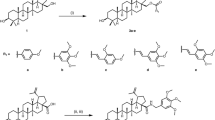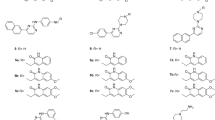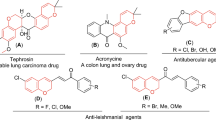Abstract
XR9051 (N-(4-(2-(6,7-Dimethoxy-1,2,3,4-tetrahydro-2-isoquinolyl)ethyl)phe nyl)-3-((3Z,6Z)-6-benzylidene-1-methyl-2,5-dioxo-3-pipera zinylidene) methylbenzamide) was identified as a potent modulator of P-glycoprotein-mediated multidrug resistance (MDR) following a synthetic chemistry programme based on a natural product lead compound. The activity of XR9051 was determined using a panel of human and murine drug-resistant cell lines (H69/LX4, 2780AD, EMT6/AR 1.0, MC26 and P388/DX Johnson). XR9051 was able to reverse resistance to a variety of cytotoxic drugs, including doxorubicin, etoposide and vincristine, which are associated with classical MDR. At a concentration of 0.3-0.5 microM, XR9051 was able to fully sensitize resistant cells to cytotoxics, whereas little or no effect was observed on the corresponding parental cell lines. No effect of XR9051 was observed on the response of cells to non-MDR cytotoxics such as methotrexate and 5-fluorouracil. XR9051 was consistently more potent than cyclosporin A (CsA) and verapamil (Vpm) in all assays used. XR9051 inhibited the efflux of [3H]daunorubicin from preloaded cells and, unlike CsA and Vpm, remained active for several hours after removal of resistance-modifying agent. In photoaffinity labelling experiments employing [3H]azidopine, XR9051 was able to displace binding to P-glycoprotein. In binding studies using [3H]vinblastine, XR9051 was shown to be a potent inhibitor of the binding of the cytotoxic to P-glycoprotein (EC50 = 1.4 +/- 0.5 nM). Taken together, the results indicate that XR9051 reverses the MDR phenotype through direct interaction with P-glycoprotein.
This is a preview of subscription content, access via your institution
Access options
Subscribe to this journal
Receive 24 print issues and online access
$259.00 per year
only $10.79 per issue
Buy this article
- Purchase on Springer Link
- Instant access to full article PDF
Prices may be subject to local taxes which are calculated during checkout
Similar content being viewed by others
Author information
Authors and Affiliations
Rights and permissions
About this article
Cite this article
Dale, I., Tuffley, W., Callaghan, R. et al. Reversal of P-glycoprotein-mediated multidrug resistance by XR9051, a novel diketopiperazine derivative. Br J Cancer 78, 885–892 (1998). https://doi.org/10.1038/bjc.1998.597
Issue Date:
DOI: https://doi.org/10.1038/bjc.1998.597
This article is cited by
-
Selective toxicity of ginsenoside Rg3 on multidrug resistant cells by membrane fluidity modulation
Archives of Pharmacal Research (2008)
-
Novel tetrahydroisoquinolin-ethyl-phenylamine based multidrug resistance inhibitors with broad-spectrum modulating properties
Cancer Chemotherapy and Pharmacology (2006)
-
The molecular interaction of the high affinity reversal agent XR9576 with P‐glycoprotein
British Journal of Pharmacology (1999)
-
In vivo efficacy of XR9051, a potent modulator of P-glycoprotein mediated multidrug resistance
British Journal of Cancer (1999)



